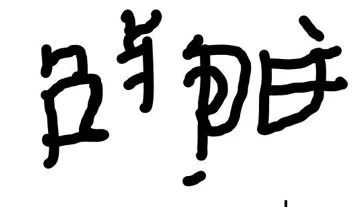Here is part of the first chapter of Old King Joe, a novel I’m writing. A fading legend of horror fiction appears to have reconstituted the first language ever spoken, and his assistant struggles to understand its strange effects.
Portions appearing here are copyright 2024 Chris McCue.
Old King Joe wintered in his smaller second home, Court Hollow, alone with his assistant Clare in the cool mountains of northern Georgia. Surprisingly to Clare, their relationship was very clear--she was his assistant and he was her teacher. As long as she made the iced tea and burgers, and brought him up some girls from Atlanta when he needed, she knew they would remain close friends, and neither would return in shame to Baltimore.
The Scripture of Old King Joe, mostly readable to him alone, occupied four plastic K-mart bins in his assistant Clare’s storage unit. One day in his seventieth year, Old King Joe bade Clare fetch volumes II – IV, which she recalled were his syncretist verses, alternating between poetry and prose dozens of times within each long chapter, and with a syntax seemingly most similar to Arabic – or so said the king.
They were specially made blank Bibles which he had filled with very neatly handwritten symbols, in an alphabet of fifty-six characters Clare had seen, and six types of diacritical markings. They were mostly very rational, angular letters, though there appeared to be additional pictographic shorthand in what Joe called his more lyrical moments. King Joe insisted he was channeling the Merat language in his trance writing sessions, a language he said was lost long ago and probably had never been written before, as it would have been the first language. In her spare moments between managing his commitments, appetites, royalty checks and bills, she researched what she could about this Merat language, unknown to Joe. She found no record of it and couldn’t disprove this story.
After the first few months of being his personal assistant and, as Joe had it, friend, she’d developed an unerring sense of when Joe was spouting bullshit. It was almost everything he said. But enduring the bullshit no longer was the chore it was with her ex-husband. The money was good, the work was peaceful enough, the mountain air fluttering through her office curtains was cool and sweet. Joe was harmless--a snake to a handler who knew how to milk its venom and how often. He appreciated her. The first inkling she got that the bullshit might become unendurable was not when the automatic writing started. That was clearly bullshit, but she didn’t have to do anything, so she let it continue.
Joe’s handwriting improved immensely as he wrote the books of the first volume. Clare told Joe it was clear that he had never written anything in this language before. He asked her to please rewrite the characters more legibly, and she insisted she couldn’t. Joe said he’d do it, but only managed to transcribe the first two pages before the submission deadline for Volume I. Incredibly, they’d been able to get someone to publish an unreadable book.
“Scripture”, Joe would correct her.
Seeing him continue the writing for months, how consistent the language appeared, how much time he spent on it, she knew whatever bullshit it was, was something important to him, so maybe he really was writing something.
She only became concerned years later, when he asked her to start contacting linguists, and later cryptographers, to attempt to crack the language. That was useful as a stunt--they had their intern Alexis tape it, post it to social, sent press releases to relevant media. There was always a boost in sales to Joe’s back catalog, an average of five percent increase over a library of three dozen potboilers.
The expense of flying these experts to Georgia made sense as a press release and a social media post, she informed him, but once he started asking for cryptographers to puzzle over each new volume it became a sore point. They argued more intensely each time, until Joe reminded her that he was, at the end of the day, Old King Joe. Clare asked for a raise, received it, and made the calls.
The cryptographers Joe brought out of retirement were not up to the challenge of decoding Volume XII – the only one he permitted them to copy, and that was three years ago. One would be forgiven for saying that the cryptography community was close-knit—actually it was composed of dozens of rivaling cliques, bands of five or six coders and one or two women they all fought over—but the study was actually not as large as many would think. Every third cryptographer was an avid fan of C. 20th SIGINT history and operations, with several stock lectures on the Enigma machine and the Navajo Code Talkers, as well as presentations on the future of cryptography in the age of Facebook, dated 2006 and now wildly inaccurate—to the extent that freshmen attending these presentations would overturn basic conceptual explanations in the Q&A sections. This third of cryptographers had at one time also been freshmen in small colleges, and bluffed through an English paper or two with their cursory knowledge of SIGINT history, and they had had a peak experience during a days-long caffeinated blur that the history of codes would not be a bad way to make a living by bluffing through. To this third Jeff Wu belonged.
A third of all cryptographers in the “community” were well-connected academics. In their cliques they were liked, but not well liked. They were necessary to save half of all cryptographers from base hermitage and schizotypal obsession. It was to this third R. Mealy belonged.
Still another third were true, practicing cryptographers, though they rarely thought of themselves as such. They were private sector coding experts, many of whom operated well below their true skill level in the company of their peers due to non-disclosure agreements they’d made with clients in high levels of government. They were true polymaths, with deep understanding of video standards and Internet security layers, without much respect for the technology of coding past. It was to this third Sarah Jane Karos belonged, and to which Old King Joe had indeed belonged once, though none were able to find evidence of it.
King Joe had taught himself enough Internet to find R. Mealy’s contact information, and invited him to convene a team of codebreakers to read from a copy of Volume XII of his scripture. He expected them to agree that while they were not able to decipher his language, it had its own consistent syntax and that Joe was not faking and writing a lot of nonsense. But Mealy’s team could not conclude that, given the window of time they had to conduct the study. So King Joe felt it was necessary to give the world a hint and, clearing his throat that October, read aloud a translation of Chapter I of the Book of Shells, which was in Volume XII.
Greatest above, set your anchor upon
My bedrock and drift not far—
Spare some wind of your sails
Breathe me new life
And my pride serve thee, great Sa̋.
Here was the foothold that rekindled the curiosity of Mealy himself—and thus the core members of his team—the first phrase, addressing Great Sa̋, mirroring the last.
read the right side of line 1, and the left side of line 5 read
.
Thus the root word of “great” was revealed, as well as what seemed to be the one-character name of the divinity Sa̋.
When Old King Joe spoke the divinity’s name, there was a special emphasis, a velocity and a hint of increased sibilance in its only consonant, no aspiration at its end. The character was coded to the S sound—it appeared that the A vowel sound was implied by this language.
This verse was all Old King Joe would read them, though he agreed to repeat it once for a second team, as the first team’s recording had been accidentally fouled up by an intern.
They were permitted to ask one question on the Scripture. After some debate, the second team developed this risky two-in-one:
“Is the scripture written in a language which would have been originally transcribed from a spoken language, as spoken languages such as Hebrew or English began their lives as spoken rather than written?”
King Joe stared intensely into Mealy’s eyes as he pronounced this final syllable, dark brown eyes flaring under two starbursts of white wire. He seemed to be searching Mealy, desperately inspecting him for parasites.
The name of Sa̋ pounded Mealy’s mind out of his brain and into the next room. The sound of the words in the Merat language washed his body five feet back, rolled over on an invisible tide, pulled forward again, and tumbled through the wall into the darkened kitchen. The lights were black, the cabinets were scarlet and their shadows green. The underside of the table was a rich red velvet field with vast monuments like eucalyptus cough drops. The field was covered with long, soft grass, like a hay field. The wave bearing him up broke on a rolling incline in the field, and the water clung to his thighs and calves as he climbed to his feet. Over the horizon there was no inverted fridge, and King Joe’s den was not beyond, hanging from the ceiling. The expanse of slate sea was absolute below, and above the horizon pulsed forward in bands of gray, blotting the brown sky. A shadow accumulated behind the gray curtain, shifting and undefined.
“Sa̋!”
Mealy came back with Wu vigorously shaking him by the shoulders. He blinked and wiped the foam off his mouth. He was sandwiched between Wu and Karos on the couch below Joe’s raised level.
“How long was I out?” Mealy asked.
“Just a second,” Wu said.
(C) 2024 Chris McCue


